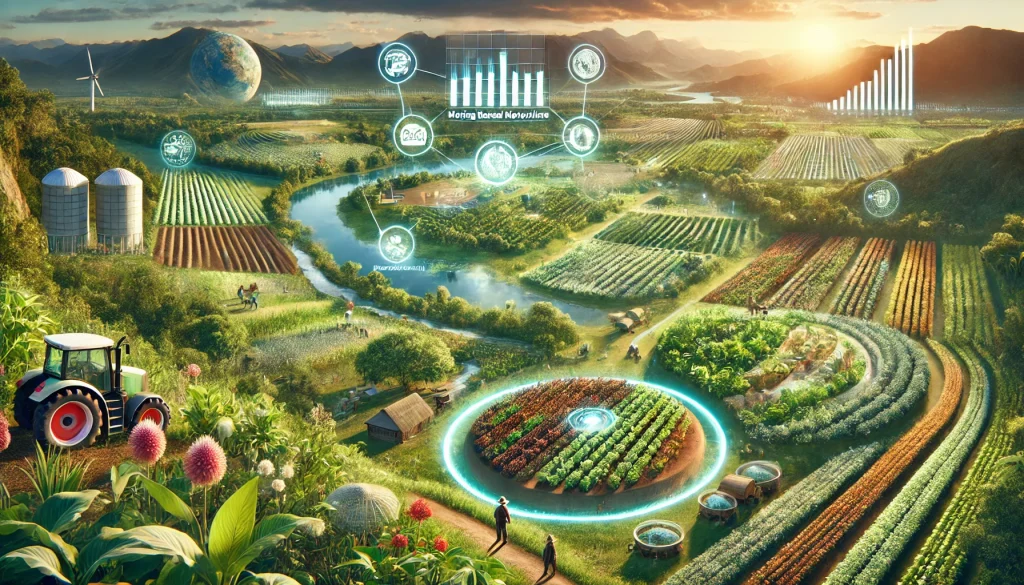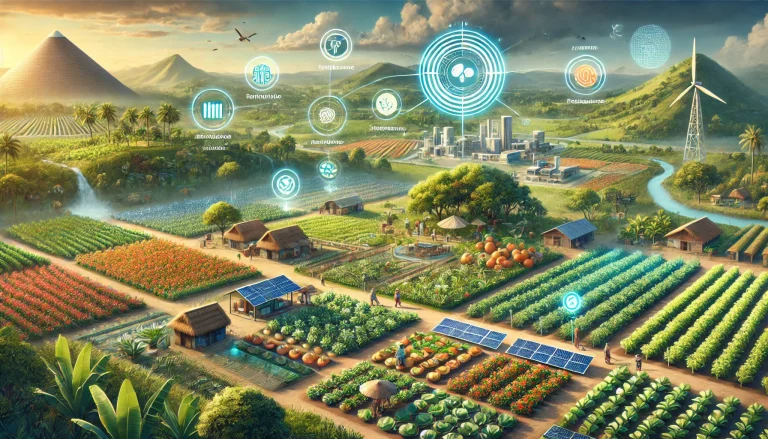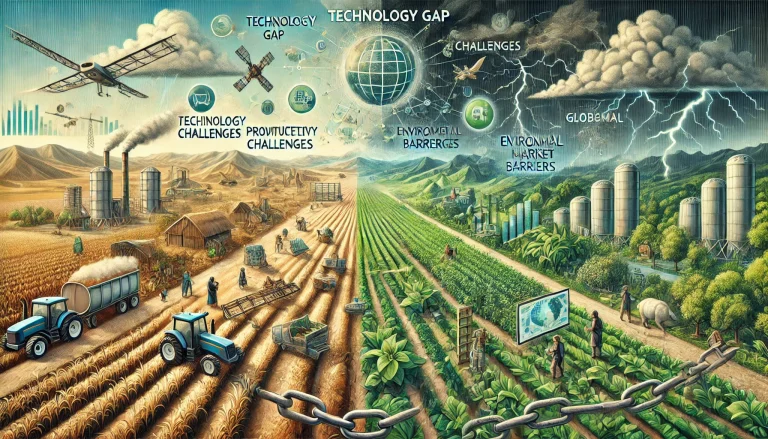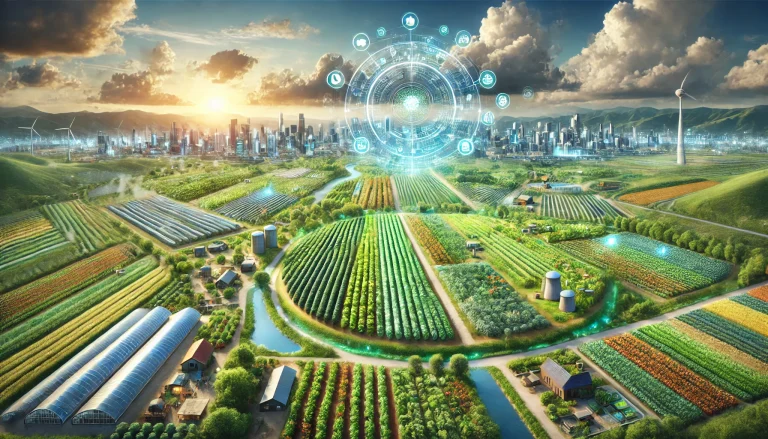Problem Statement:
Monoculture, the agricultural practice of growing a single crop over a large area, has become a dominant method in modern farming due to its perceived efficiency and simplicity. This practice allows for streamlined planting, harvesting, and marketing processes, making it economically attractive for many farmers. However, the long-term environmental and ecological consequences of monoculture are severe. The continuous cultivation of a single crop depletes essential soil nutrients, leading to soil degradation and reduced fertility over time. This degradation necessitates the increased use of chemical fertilizers, which can further harm the soil and contribute to pollution. Additionally, monoculture increases the vulnerability of crops to pests and diseases. Without crop diversity, a single pest or disease outbreak can devastate entire fields, leading to significant economic losses for farmers. The lack of biodiversity in monoculture systems also disrupts ecosystems, reducing the presence of beneficial insects and other organisms that contribute to a balanced agricultural environment. Furthermore, monoculture practices often lead to deforestation and the loss of natural habitats, further exacerbating environmental degradation. The long-term sustainability of farming is threatened by these practices, as they compromise the health of the land and the resilience of agricultural systems to climate change and other challenges. To address these issues, it is crucial to develop and promote agricultural practices that prioritize diversity, soil health, and ecological balance.
Pain Points:
- Soil Nutrient Depletion: Continuous monoculture exhausts essential soil nutrients, leading to decreased fertility.
- Increased Pest and Disease Vulnerability: Lack of crop diversity makes monoculture fields more susceptible to widespread pest and disease outbreaks.
- Reduced Biodiversity: Monoculture reduces the variety of plant and animal life, disrupting ecosystems and natural pest control.
- Environmental Degradation: The reliance on chemical fertilizers and pesticides in monoculture contributes to soil degradation, water pollution, and loss of habitats.
- Economic Risk: Farmers face significant financial losses when pests or diseases affect monoculture crops, as entire fields can be wiped out.
- Increased Reliance on Chemical Inputs: Monoculture systems often depend on synthetic fertilizers and pesticides to maintain yields, leading to environmental and health concerns.
- Soil Erosion: Monoculture practices can lead to soil erosion, particularly in areas with poor land management.
- Water Scarcity: Monoculture can exacerbate water use, depleting local water resources, especially when water-intensive crops are grown.
- Loss of Resilience: Monoculture reduces the ability of agricultural systems to adapt to climate change and other external shocks.
- Negative Impact on Pollinators: The lack of floral diversity in monoculture fields can reduce the habitat and food sources for pollinators, leading to declines in these crucial species.
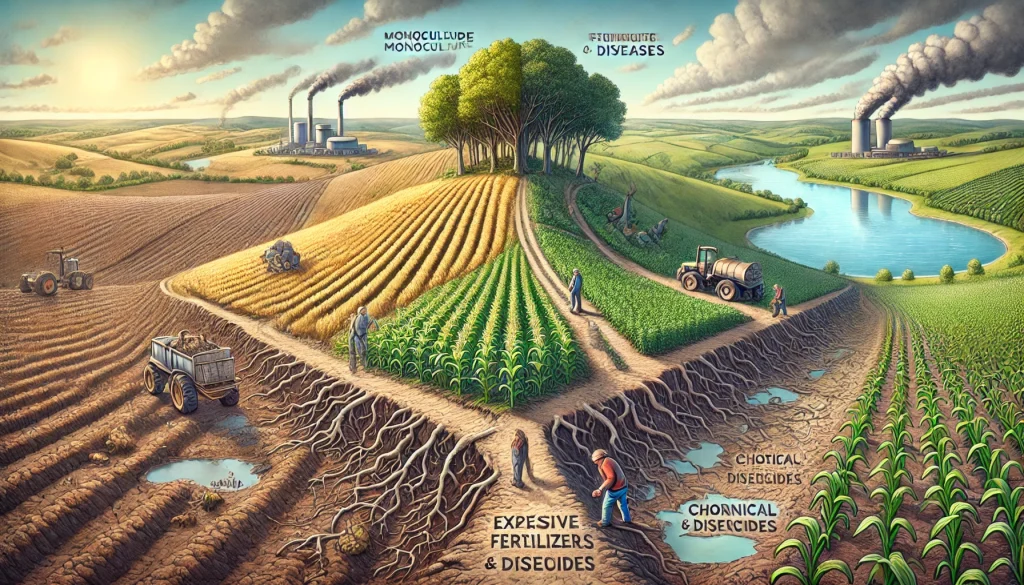
Future Vision:
The future of agriculture lies in moving beyond monoculture towards more sustainable and diversified farming practices that prioritize ecological health, soil fertility, and long-term productivity. This vision includes the development of a platform that promotes crop diversification, regenerative agriculture, and integrated pest management as key strategies for creating resilient farming systems. The platform would provide farmers with access to resources and tools that enable them to implement crop rotation, intercropping, and polyculture practices that enhance soil health and reduce the need for chemical inputs. It would also offer educational resources on the benefits of biodiversity, soil conservation, and sustainable water management. By leveraging data analytics and precision agriculture technologies, the platform would help farmers optimize their planting strategies, monitor soil health, and manage pests more effectively. Additionally, the platform would connect farmers with markets that value sustainably produced crops, offering incentives for adopting eco-friendly practices. Partnerships with agricultural research institutions, environmental organizations, and government agencies would support the dissemination of best practices and the development of policies that encourage sustainable agriculture. Ultimately, this platform would empower farmers to transition away from monoculture, leading to more resilient, productive, and environmentally friendly farming systems that can withstand the challenges of climate change and ensure food security for future generations.
Use Cases:
- Crop Rotation Planning: The platform provides farmers with tools to plan and implement crop rotation schedules that improve soil health and reduce pest pressure.
- Intercropping Strategies: Farmers access resources on intercropping methods that increase biodiversity and enhance crop yields.
- Soil Health Monitoring: The platform offers tools for assessing soil fertility and tracking improvements through sustainable practices.
- Integrated Pest Management (IPM): Farmers use the platform to implement IPM techniques that reduce reliance on chemical pesticides.
- Water Conservation Practices: The platform provides guidance on sustainable irrigation and water management techniques that conserve resources.
- Market Access for Diverse Crops: Farmers connect with buyers interested in sustainably produced, diversified crops, securing better prices.
- Regenerative Agriculture Support: The platform offers resources and training on regenerative practices such as cover cropping and agroforestry.
- Precision Agriculture Tools: Farmers use data-driven technologies to optimize planting, fertilization, and irrigation based on soil and environmental conditions.
- Biodiversity Promotion: The platform educates farmers on the benefits of maintaining and enhancing biodiversity on their farms.
- Climate Resilience Building: The platform provides information on how diversified farming systems can better withstand climate change impacts.
Target Users and Stakeholders:
Target Users:
- Farmers (small to large scale) seeking to transition from monoculture to more sustainable practices.
- Agricultural cooperatives and organizations promoting crop diversification and soil health.
- Agribusinesses interested in sustainable supply chains and resilient farming practices.
Stakeholders:
- Government agencies focused on agriculture, environmental protection, and climate resilience.
- NGOs working on biodiversity conservation, sustainable agriculture, and rural development.
- Environmental organizations advocating for regenerative agriculture and ecosystem restoration.
- Technology companies developing precision agriculture tools and sustainable farming solutions.
- Consumers interested in supporting environmentally friendly and diverse agricultural practices.
Key Competition:
- Regeneration International: Promotes regenerative agriculture practices globally, offering resources and advocacy for sustainable farming.
- Farmers Business Network (FBN): Provides data-driven insights and tools to help farmers optimize their practices, including crop diversification.
- Indigo Ag: Focuses on microbial seed treatments, crop diversification, and carbon sequestration to improve soil health and sustainability.
- Agroecology Europe: Advocates for agroecological practices that prioritize biodiversity and sustainable farming across Europe.
- Sustainable Agriculture Research and Education (SARE): Provides grants and educational resources for sustainable farming practices, including crop diversification.
Products/Services:
- Crop Rotation Planning Tools: Software that helps farmers design and implement effective crop rotation schedules.
- Intercropping Resources: Guides and tools for integrating diverse crops into farming systems to enhance biodiversity and productivity.
- Soil Health Assessment: Tools and services for monitoring soil fertility, structure, and organic matter levels.
- Integrated Pest Management Solutions: Products and services that support the adoption of IPM techniques to reduce chemical use.
- Water Conservation Technologies: Sustainable irrigation systems and water management tools that optimize resource use.
- Sustainable Marketplaces: Platforms that connect farmers with buyers interested in diverse, sustainably produced crops.
- Regenerative Agriculture Training: Educational programs and resources that support the adoption of regenerative practices.
- Precision Agriculture Technologies: IoT devices, drones, and sensors for optimizing planting, fertilization, and water management.
- Biodiversity Enhancement Services: Consulting and tools for increasing and maintaining biodiversity on farms.
- Climate Resilience Planning: Resources and tools that help farmers build resilience to climate change through diversified practices.
Active Startups:
- Regrow: Focuses on regenerative agriculture practices, providing tools and resources for improving soil health and sustainability.
- AgroSustain: Develops natural, plant-based solutions for crop protection, reducing the need for chemical pesticides.
- CIBO Technologies: Offers data-driven insights and tools to help farmers adopt sustainable practices and improve soil health.
- Soil Capital: Provides financial and technical support for farmers transitioning to regenerative agriculture and sustainable practices.
- Agroecology Fund: Supports initiatives that promote agroecology and biodiversity, helping farmers move away from monoculture.
Ongoing Work in Related Areas:
- Research on agroforestry systems that integrate trees and crops to enhance biodiversity and soil health.
- Development of natural pest control methods that reduce the need for chemical inputs in monoculture systems.
- Soil restoration projects focused on rebuilding soil organic matter and fertility in degraded agricultural lands.
- Biodiversity enhancement programs that support the reintroduction of diverse plant and animal species into farming systems.
- Sustainable agriculture policy initiatives that promote crop diversification and environmentally friendly practices.
Recent Investment:
- $150 million investment in Indigo Ag in 2023 to expand their work on crop diversification and regenerative agriculture practices.
- $100 million raised by Regrow in 2022 to scale their regenerative agriculture platform and reach more farmers globally.
- $75 million in funding for CIBO Technologies in 2023 to enhance their data-driven tools for sustainable farming.
- $50 million in venture capital for AgroSustain in 2024 to develop and distribute their plant-based crop protection solutions.
- $35 million invested in Soil Capital in 2023 to support farmers transitioning to sustainable and regenerative practices.
Market Maturity:
The market for sustainable agriculture practices that move beyond monoculture is gaining momentum as awareness of the environmental and economic risks of monoculture grows. Farmers, agribusinesses, and consumers are increasingly recognizing the importance of biodiversity, soil health, and ecological balance in ensuring long-term agricultural productivity. Investments in regenerative agriculture, crop diversification, and precision farming technologies are rising, driven by the need to build resilience against climate change and environmental degradation. Governments and international organizations are also playing a key role in promoting sustainable practices through grants, subsidies, and regulatory support. While challenges remain in scaling these practices and reaching all farmers, particularly in regions with strong monoculture traditions, the market is steadily maturing. As more farmers adopt diversified and sustainable practices, the agricultural sector will become more resilient, environmentally friendly, and capable of meeting the challenges of the future.
Summary:
Monoculture has long been a staple of modern agriculture due to its perceived efficiency, but the practice comes with significant environmental and economic risks. The continuous cultivation of a single crop depletes soil nutrients, increases vulnerability to pests and diseases, and reduces biodiversity, leading to long-term degradation of the land and the sustainability of farming systems. To address these challenges, there is a growing need for a platform that promotes crop diversification, regenerative agriculture, and sustainable practices. By providing farmers with the tools, resources, and market access they need to transition away from monoculture, the platform would help build resilient, productive, and environmentally friendly farming systems. As the market for sustainable agriculture continues to mature, driven by increased investment and support, there is a significant opportunity to transform the agricultural landscape, ensuring food security and environmental health for future generations.
